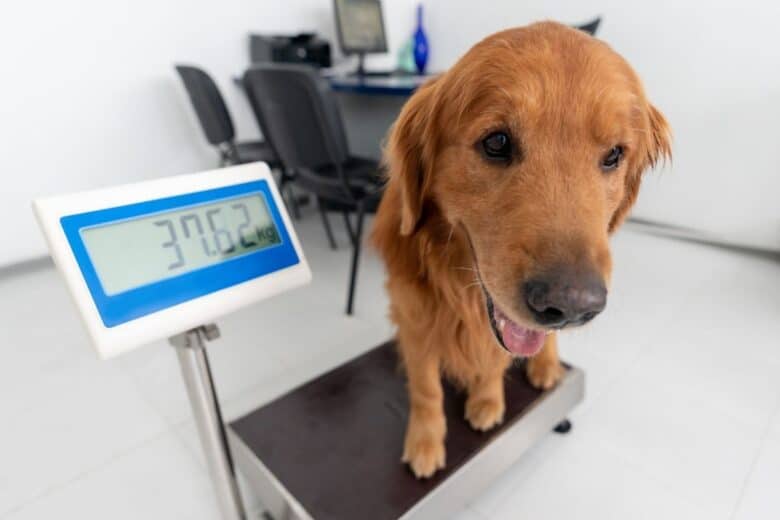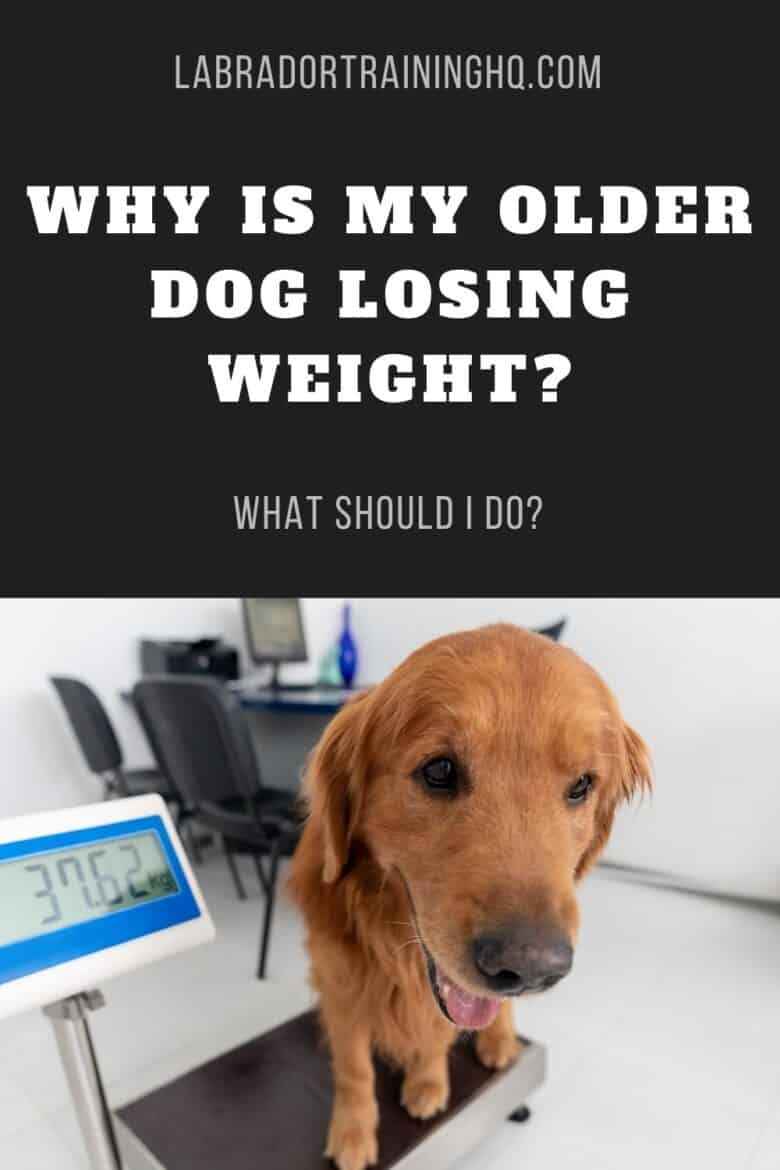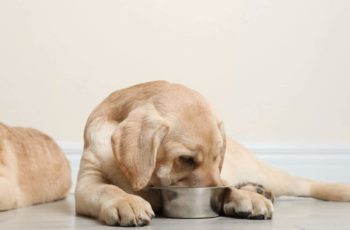This post may contain affiliate links. We may earn money or products from the companies mentioned in this post.
Usually, when we talk about older dogs, we talk about them putting on weight.
They have less energy and a slower metabolism, so it’s not unusual for them to pile on a few extra pounds, much like humans. But what if your senior dog starts to lose weight?
It is actually a myth that all older dogs gain weight as their bodies change. They might equally find themselves losing weight, much like people. So, dropping a little bit of weight can just be a natural part of getting older.
But, if your older dog starts losing significant weight, either suddenly and rapidly or slowly and gradually, it could also be a warning sign that something is not quite right with their health.

In this article, you will find a list of the most common causes of weight loss in older dogs and the key associated symptoms to look out for when talking with your vet to determine whether you should be worried and what the cause might be.
We will also look at what you should be feeding senior dogs to help them maintain a healthy weight.
But first …
DISCLAIMER: We are not veterinarians, if your dog is losing weight or has any health problems please talk to your veterinarian.
Contents & Quick Navigation
How Much Weight Loss Is Worrying?
Just like you, your dog’s weight will fluctuate depending on what they’ve been doing, what they’ve been eating, and even their mood.
Also, the changes that older dogs undergo in their hormones and metabolism mean it is just as likely that they will drop some weight and settle with a skinnier physique as pile on a little bit of weight as they age.
So, when should you start worrying if your dog is losing weight?
The answer: significant weight loss.
Vets define significant weight loss as 10% of a dog’s normal body weight.
You will probably notice if your dog loses that kind of weight. But remember, with a small five-pound pup, that is just half a pound.
PRO TIP: One habit worth getting into is taking your dog to the vet just for a quick visit to say hi to the staff and use their scale for a weigh in. This will help develop positive associations with your vet and give you a chance to monitor the weight of your dog.
Common Causes Of Weight Loss In Older Dogs
There are a variety of different problems that can cause weight loss in older dogs.
Depending on the problem, they may also display other symptoms that can help you and your vet make a diagnosis and start treating the problem.
Below are the most common causes of significant weight loss in older dogs.
Dental Problems
Your dog may start showing less interest in what is in his bowl if he is having problems with his teeth. If it is painful for them to eat, it will be less likely for them to chow down, and weight loss is the inevitable result.
If the problem is in their teeth, you will probably notice other symptoms such as excessive drooling, bad breath, and discolored or swollen gums.
This is probably one of the most common reasons for weight loss in older dogs. By the age of three, around 80% of dogs are already suffering with dental issues, and it just becomes more prevalent as they age.
Treatment will require a trip to the vet, who may recommend the extraction of infected teeth or medication to deal with other dental issues. They may also suggest a new dental care routine.
For example, if you have been using dental chews for years, but they are now too tough for your dog’s teeth, it may be time to take a brush to them and start cleaning them yourself.
Again, moving your dog into wet food can also be a good idea if they have dental issues, as it requires less chewing, so will be easier for them to eat.
PRO TIP: You can soak kibble in warm water for 10-15 minute which will make it easier for your dog to chew and will help to keep her better hydrated.
Diabetes
As dogs enter their middle and older years, they become more likely to develop diabetes.
One of the early signs of this is weight loss, as they are unable to get the energy they need from the glucose they eat, so their bodies will start burning stored fat and muscle for energy.
Other signs your dog may have developed diabetes include excessive thirst and urination, an increased tendency to develop urinary tract infections, and general lethargy.
Diabetes can be managed in dogs with a combination of insulin injections and a special diet designed to keep their blood glucose levels on an even level.
Your vet can help you develop the right regimen (medication and/or diet) for your diabetic pup.
The ideal diet will be high in good quality protein and low in carbohydrates and sugars.
Dehydration
Generally speaking, as dogs age, they tend to have a reduction in fluids, which may cause them to lose a little bit of weight.
But older dogs can also be inclined to drink less, which can result in dehydration, and this can be dangerous to their health.
If this is what is causing your dog to drop pounds, you will probably notice other symptoms as well.
The most common of these are a reduced need to urinate, urine that is darker in color than normal, general lethargy, and rubbery gums.
If you suspect your dog of being dehydrated, you should encourage them to drink more water. You can do this by ensuring that their water is always fresh.
Change it every day or invest in a bowl that circulates water. If they eat mostly dry food, you can also introduce some wet food into their diet, which also acts as a source of moisture.
However, if they seem to be drinking regularly and are still showing symptoms of dehydration, it is time for a trip to the vet, as dehydration can also be a symptom of a number of medical conditions.
Liver Or Gallbladder Disease
Weight loss can also be a sign that something is not quite right in your dog’s liver or gallbladder. As these are both parts of the digestive system, weight loss can be one of the first symptoms.
If the liver is the cause, you will probably also notice other digestive issues, such as decreased appetite, vomiting, and diarrhea.
They will probably also show signs of pain and may experience fever, and you might notice a yellowing of the gums, skin, and eyes.
There are both medical and surgical options available to treat liver disease, depending on the case of the problem. If caught early, there is a good chance that your dog will make a full recovery.
Kidney Disease
Problems in the kidneys can also cause weight loss in dogs. Whenever one of the major organs stops functioning properly, it can play havoc with your dog’s body.
Other symptoms include vomiting, diarrhea or constipation, a loss of appetite, depression, lethargy, and pale gums.
Unfortunately, when these symptoms develop, the disease is usually quite far advanced and can be difficult to treat.
This is one of the reasons it is important to monitor your dog’s weight and not simply dismiss a little weight loss as a natural part of the aging process.
Heart Disease
Weight loss can be one of the early signs of heart disease in dogs, and may alert you to the problem with time to act.
Other symptoms related to the disease can include a chronic cough, difficulty exercising and tiring out easily, and general restlessness.
Depending on the severity of the condition, heart disease can be managed with a combination of medications and lifestyle changes, but only if it is caught early.
Unfortunately, our Linus battled heart disease in his final weeks. He lost his appetite and his weight loss was very noticeable.
Cancer
Sadly, cancer is a killer in canines as well as humans, and weight loss can be one of the first symptoms that can alert you that your dog has the disease.
You will probably also notice they are lethargic in general and don’t have much interest in eating.
They can develop lumps and swellings, as well as unusual bleeding. You may also notice a distended abdomen and limping or lameness.
Unfortunately, dogs often don’t present symptoms until their cancer is quite advanced, but depending on the location and severity of their cancer, you may have a number of treatment options.
Stetson lost his battle with cancer. However, he did not lose weight (he gained weight) and he didn’t lose his appetite until his final days.
What To Feed Older Dogs
If your vet doesn’t think your dog’s weight loss is a major medical concern and is just part of getting older, that doesn’t mean there is nothing you can do.
Feeding your older dog an appropriate diet for their age can help you maintain them at a healthy weight, so they continue to enjoy the best possible quality of life for as long as possible.
So, what exactly does a healthy diet look like for older dogs?
Well, starting with calories, older dogs are usually less active and have a slower metabolism, so they need fewer calories than when they were younger.
If a medium-sized, active dog needs about 27 calories per pound of their body weight, as they get older, you need to reduce their caloric intake by about 20%.
But no two dogs are the same, so you need to monitor your dog’s weight to see if this is enough for them to sustain their current lifestyle, or they need a little bit more.
If they are losing weight, then their hormone changes suggest they need more calories to sustain themselves.
In this case, you might want to increase their caloric intake by 10%. If they are still losing weight, then go up to 20%.
They will also benefit from more good quality protein, such as red meats, fish, and chicken and less low-quality meats such as meals and by-products.
This will help increase their metabolism, as will foods that include L-carnitine in their nutrient pack.
Some research suggests that dogs might need up to 50% more protein in their diet as they age, and they should certainly be getting a minimum of 25% of their calories from protein.
Some people worry that too much protein might play havoc with their older dog’s kidneys. But research suggests that unless your dog has kidney problems, more protein is better when it comes to older dogs.
But, as you want to be feeding their lean muscle and not their fat stores, the food you choose to give them should be lower in fat than what they might be used to.
Older dogs can also benefit from reducing the amount of sodium in their diet, which can exacerbate hypertension, heart problems, and kidney problems.
A bit of extra calcium to help maintain their teeth and bones is also ideal.
Older dogs often develop joint problems as well, which can hinder their appetite if bending down to their bowl becomes uncomfortable.
Not only should you put their bowl somewhere easy to reach, but choose foods enhanced with glucosamine, which can soothe sore joints and slow down their deterioration.
Moving your dog into wet food can also be a good idea for a number of reasons.
First, if they have a decreased appetite, and the smell of the wet food might make them more excited about tucking in.
Second, older dogs can be prone to dehydration, and wet dog food can give them a lot of the moisture they need.
Thirdly, they are increasingly likely to have dental problems as they age, and wet food is just easier to chew!
If you are looking for more information on what to feed your senior dog, check out our article on proper nutrition for senior labradors, and our review of the best dog food for senior pups.
FAQs
Why Is My Old Dog Losing Weight?
There are a lot of reasons an old dog might start losing weight. It could be a result of natural changes to their metabolism and hormone levels as they get older, which simply means a bit of a change in diet is in order.
However, it could also be a symptom of a medical condition that requires treatment.
Dogs will often go off their food if it is painful for them to eat, either because of dental problems or joint problems that mean their bowl is difficult to access.
A change in their eating arrangements could get them eating normally again.
However, a variety of serious medical conditions can also put them off their food or leave their body unable to properly produce energy from food, and therefore, rely on fat stores instead.
Examples of this include diabetes, kidney disease, and heart disease. These will usually be accompanied by other symptoms, which will help you make a diagnosis with your vet.
Is It Normal For An Old Dog To Lose Weight?
While we might think of older dogs piling on the pounds as they get less active, they may have the opposite response to aging.
Changes in their hormones with age can change the way the body generates energy. This could leave them being naturally leaner.
However, when older dogs lose weight, it could also be a symptom of a medical condition they become more prone to when they are older, such as diabetes, heart disease, or dental disease.
How do you know which it is? You probably don’t need to start worrying about your older dog losing weight until they have lost about 10% of their body weight.
Also, look out for other changes in their behavior and appearance that could be an indicator of something else going wrong.
What Are The Signs Of A Dog Dying Of Old Age?
Loss of appetite and a related loss of energy can be one of the signs your dog is finally succumbing to old age and entering their final days.
But, if this is the case, you won’t be curious about the source of their weight loss, as you will have observed they have stopped eating.
Other signs associated with dying of old age include a loss of coordination and general disorientation and confusion.
When the end draws close, you will probably also find that your dog goes off on their own. Dogs tend to hide when they believe they are going to die.
How Do You Fatten Up An Old Skinny Dog?
Older dogs can lose their appetite, which can make it difficult to maintain their weight. But you can help by making their food as enticing as possible.
This often means abandoning the dry kibble for aromatic wet food or you can also add gravies to their kibble to make it more enticing.
A great fresh dog food we feed our dogs from time to time is The Farmer’s Dog. Raven and Elsa eat this food faster then I can say “Bob’s your uncle”.
You should also consider whether your dog is not eating because they aren’t hungry or because they are having trouble eating.
Dental issues might mean chewing is uncomfortable and mobility issues could mean that leaning down to their bowl is a little challenging.
Switching to wet food and putting their bowl on something raised so they don’t have to bend down to get to might see them suddenly hungry again.
The Verdict
If your dog starts losing weight as they get older, it may or may not be a cause for concern. It could just be a natural part of the way their body is changing with age or it could be a sign of a more serious medical condition.
The only way to know is to monitor your dog for other symptoms and speak to your vet to identify what might be going on with your dog.
If their weight loss does seem to be just a natural response to changing hormone levels, then it is also time to change their diet to one that is suitable for maintaining their health in this new phase of life.
Have you dealt with an older dog losing weight?
What was the cause and what did you do?
Share your experience with the community in the comments section below.
Save To Pinterest

Top Picks For Our Dogs
- BEST PUPPY TOY
We Like: Snuggle Puppy w/ Heart Beat & Heat Pack – Perfect for new puppies. We get all of our Service Dog pups a Snuggle Puppy. - BEST CHEW TOY
We Like: KONG Extreme – Great toy for heavy chewers like our Labrador Retrievers. - BEST DOG TREATS
We Like: Wellness Soft Puppy Bites – One of our favorite treats for training our service dog puppies. - BEST FRESH DOG FOOD
We Like: The Farmer’s Dog – A couple months ago we started feeding Raven fresh dog food and she loves it! Get 50% off your first order of The Farmer’s Dog.
For a list of all the supplies we get for our new service dog puppies check out our New Puppy Checklist on the PuppyInTraining.com blog.
Why Your Older Dog Is Losing Weight And What To Do was last modified: March 8th, 2021 by


